Greetings!
This week’s destination is the famous Tibetan Labrang Monastery at Xiahe. This was one of the very few places on the trip where we encountered other travellers and for good reason for Xiahe is an amazing place, certainly one of the highlights of the entire expedition. It is the largest and most important Tibetan monastery outside of Tibet itself and I must admit to being surprised at finding such a piece of Tibet so far from the territory. In fact, Xiahe is a meeting place of four of China’s major cultures – Tibetan, Han Chinese, Mongol and Chinese Muslim – and it is the furthest north and west you can find Tibetans. Meeting places are always fascinating but they are often quite gruesome too. The Austrian explorer Joseph Rock visited in 1929 after Chinese Muslims under General Ma Qi had fought with the local Ngolok Tibetans and there were Tibetan skeletons strewn everywhere and decapitated heads decorated the monastery. Thankfully, things were far more civilised when we visited but even today there are still protests against the Chinese, the last major one being in 2008.
So, that’s Xiahe, I hope you enjoy it.
Keep travelling!
Uncle Travelling Matt
Links to all parts of the travelogue
Book 1: Embarking Upon A New Korea
1e: Seoul, Incheon and Across the Yellow Sea
Book 2: Master Potter does Fine China
Book 3: Steppe to the Left, Steppe to the Right…
26th July, 2003 – Lanzhou, China
Oh no! Another early start, this time a mind-blowingly early six o'clock. The reason again was a trip to make, this time by public bus up into the mountains to the Tibetan town of Xiahe, (pronounced 'Shaa-ha').
Unlike the day before we managed to get to the bus station on time and climbing onto the small bus we came across something that we were by now quite unused to, other foreigners, lots of them! I suppose we should have guessed, after all Xiahe is the home of a Tibetan monastery and is there anywhere on earth more cool and spiritually fulfilling than Tibet? Why, not even India comes close to that lamatastic region in the clouds. We however just settled down at the back of the bus, ready to enjoy or journey up into the mountains.
Except that there was a problem, and that was that the journey turned out to be not that enjoyable however much you might have wanted it to be. True, the scenery wasn't bad, and for large sections the road was good too, but alas, the problem was with our mode of transportation itself. Like so many of the vehicles in China, it had unfortunately been designed for people several sizes smaller than ourselves, particularly the seats up which one's bottom simply would not fit. That wouldn't have been so bad of course if the bus had been half empty, but of course it wasn't, every available inch of space was taken, and to put the icing on the cake we got stuck behind four clones of the type produced by the English Public School System who moaned incessantly throughout the whole journey, their gripes reaching fever pitch when one of the locals started smoking and opened a window, bumping the elbow of a female clone in the process. It wasn't so bad for me mind, who simply buried myself in Middlemarch and forgot about the world outside, but for the pitiable Lowlander who cannot read on buses and had ridiculously long legs, it must have been sheer torture.
The area that we passed through gradually got colder and poorer. Mao, Deng and Jiang all seemed to have missed this area out in their modernisation process, and compared with the go-ahead areas that we'd come from, this looked positively poverty-stricken. And was it any coincidence that the locality was also predominantly Muslim, with skullcapped men and black hijaabed women roaming the streets of every town that we passed through? Was the true reason behind the poverty government prejudice or perhaps something else entirely? For example, a friend of mine once gave me a university paper to read that she'd written about the woeful economic state of Bulgaria's Rodopi Mountains; a scenic yet poverty-stricken region in the country's south, predominantly populated by Muslims. In the paper she argued that the poor levels of development there were due to governmental prejudices against Muslims. And perhaps she had a point, after all the Communist government of the time's policies ranged from uneasy tolerance to ethnic cleansing. However, on the other hand she completely failed to mention the area's remoteness and unsuitability for virtually any sort of industry or agriculture beyond sheep and goat farming. It takes many bricks to build a wall and this area looked pretty desolate and remote too, so perhaps we should not be too quick to condemn the Party.
One thing that they certainly were doing there was building a road that looked as well-engineered as the one to Bingling Si, and slowed down our progress considerably. It was five hours before we reached Linxia, a small Muslim town where the bus halted and all passengers alighted to get fed and watered.
After Linxia, the construction of the new road made progress slow indeed, but by now there was more outside to hold the attention. The countryside had changed rapidly from a hot and arid wasteland into green barren mountains, more akin to the mountains of Scotland and Wales than anywhere else that I've seen. These were the lands of the Tibetans, (millions of who actually reside outside of the boundaries of Tibet and have done for centuries), and the skullcaps and headscarves had all but disappeared from the roadside. In their place were the straw and colourful costumes of those famed mountain dwellers, and in the fields brightly-coloured yurts were pegged up, with goats beside them and TV aerials protruding from the roofs. The scenes were undeniably beautiful, and it made me want to visit the real Tibet even more than I had before. On the downside however, the temperature had now dropped somewhat, and clad in but shorts and T-shirts we shivered and suffered on the bumpy bus.
When we reached Xiahe it was raining and the town looked equally dreary. We booked in at the Dasha Binguan, an equally gloomy establishment, and I finished Middlemarch whilst we waited for a sudden downpour to abate. And thus, as soon as the sky was no longer wet, we ventured up the street, through the tacky touristdom of Chinese and Muslim Xiahe to the Tibetan part of town and the famous Labrang Monastery.
Now, I will be the first to admit here that the whole spiritual thing of travelling that so many travellers rave about, doesn't really do it for me. I've been to a lot of famed holy sites and whilst they were very nice and interesting, they did alas fail to get my religious juices going. Its not that I don't have a spiritual side mind, I do and I believe it to be something very important, but it's just that I reckon that if you're really sincere about finding God or whatever it is that might be out there, you're far better off heading to your local church or chapel, (or whatever is the religion tailored to the needs of your culture), than going off to meditate on the banks of the Ganges for a few months. No, most of the sarong-wearing backpackers who bore with their deep experiences on a higher spiritual plane are in my opinion either talking crap or simply too stoned to know what they're talking about. Either way, I'm not impressed.
All that taken into account however, I must say that the Labrang Monastery in Xiahe was something special. I'm not saying that I discovered the meaning of life or that I attained Nirvana or anything, but nonetheless it was a truly breathtaking place.
The first things that we reached were the prayer wheels, a long line of brightly-coloured upended tombolas which pilgrims spun as they walked past. Quite what the purpose behind them is, I'm not sure. Upon inspection all turned out to be painted with the same images and inscriptions and besides, I can't see that passing pilgrims having time to read what they have to say anyway. Therefore I assume that the thinking in them is something akin to the Catholics with their rosary beads; by repeating the same action over and over again, the mind is able to focus more on holy thoughts, and thus assumedly come into closer communion with the divine.
After spinning the wheels, we wandered through the streets of the monastery accommodation. It seemed as if time had stood still here, the dirt roads were bordered by ancient squat stone dwellings whilst red-robed monks and colourful pilgrims, many of whom were ancient and almost bent double, thronged the thoroughfares.
And at the end of these humble dwellings were the grand buildings of the monastery itself. Capped with gold and decorated in all the colours of the rainbow, they stood out against the bleak mountain landscape. We wandered amongst them and on the pilgrim's path behind where the faithful trudged and for no apparent reason, would press their foreheads to a particular spot on the monastery wall. We passed them in the opposite direction before returning to the town by way of the riverside prayer wheels. At one point we stopped at a magnificent gold stupa, the inside of which we were shocked to find was stacked to the rafters with identical hand-written copies of a holy text.
Returning to the town via the spinning prayer wheels, the Lowlander and I got into a discussion about the inclusion of Tibet within the Chinese state. He of Lower Lands argued that whatever the case, it was wrong to occupy another country, but I was not so sure. After all, Tibet costs China a lot of money and it is they who have brought electricity and running water to the people, plus built roads, hospitals, schools and an airport, (they had wanted to build a railway too but it was found out to be impossible to do so as it would have involved tunnelling through ice). Surely, it is far better that they have a higher standard of living, decent healthcare and some semblance of a modern-day state, (the old Tibet for example was not even in the International Postal Union and stamps had to be bought at the border), than the pride of raising your own flag. Besides, the Chinese do have a historical claim to the country and a large percentage of the population are Han in origin. Whatever the truth is, the fact remained that we could never really judge without going there ourselves, but Tibetan independence supporters should bear one thing in mind. Those jolly, colourful people who smile at you from the pages of National Geographic live a life so hard that it doesn't bear thinking about. And all the efforts to alleviate that backwardness and hardship have 'Made in China' stamped all over them. Brad Pitt and Co. might look good in their Tibet film that was shot in the Andes, but how much did they actually help the Tibetans themselves? Think about it.
We dined that evening at a nice Tibetan restaurant, (well we had to didn't we?), but soon gave up on the local food after finding the famous champa (a sort of brown stodge) nauseous, and instead resorted to kebab and chips. And after that, a short conversation with the waitress and a few rounds of backgammon, we hit the sack. After all, the following day was to be yet another early start...
27th July, 2002 – Xiahe, China
The journey back to Lanzhou I must admit, did not seem half so bad as the one going. Quite why that was I know not, perhaps because there were less people on the bus, or perhaps because the worst bit of the trip (i.e. the bumpiest road), we got out of the way first? Well, whatever the case was, although the seven or so hours travelling time was still (literally) a pain in the arse, it was not nearly so taxing as before. I settled down to read The Russian Seven, an entertaining paperback about an Afghan War veteran, falsely accused of murder who travelled through the USSR on the run during perestroika, and completed the final page just as we were pulling into the city bus terminal, which was good timing if ever there was. We then transferred swiftly into a taxi and headed off to our old friend, the Lubyanka-esque Lanzhou Binguan, where we were given a room almost next-door to our previous one, and where we showered ourselves back into humanity.
After that I decided to head off to the internet café whilst the Lowlander stayed in the hotel, agreeing to meet once again at the cable car base station on the banks of the Yellow River. Alas, as so often happens when on the Information Superhighway, I lost track of the time and found to my horror when I glanced at the clock, that I was already half an hour late for our rendezvous. That lateness was only compounded when the driver behind the wheel of the taxi that I hailed, mistook my drawing of a cable car to be a boat and dropped me off at the ferry terminal, and so when I arrived almost an hour after I should have done, I expected the waiting Dutchman to be none too impressed.
I shouldn’t have worried though. Whilst he had arrived before me, it was only about five minutes before. He too had forgotten about Old Father Time, and then been taken on a tour far more elaborate than mine, crossing China’s number two river several times with a typically geographically-challenged taxi driver. Thus, both relieved at not being in each other’s bad books, we boarded the car and made our slow and steady ascent up the mountain.
Once at the top however, we decided against returning to the café where we’d dined previously, and instead to try and locate the famous White Pagoda, an eighteenth century monument that was supposedly the highlight of the mountain’s many attractions. The pagoda we soon located, but alas it was a pathetic sight compared with the one that we’d climbed at Yinchuan, and was hardly worth the effort of walking from the cable car to. It did however have one big saving grace in the form of a nice affixed tea house which commanded spectacular views over the city below, and so there we sat and started a mammoth backgammon session that proved most profitable to me. The Lowlander grew more and more exasperated with his bad luck, (though may I add here, that it wasn’t all due to luck in my opinion), and became ever more determined to play on until he won a single game. Well, that suited me and so we continued to roll until the score was five-nil in favour or Anglican party.
The Lowlander never got to see his cliff-top victory too, for at that moment we were interrupted by an inquisitive local who wished to learn the nature of the game that we were playing. Such curiosity was not unusual, many Chinese were fascinated by our backgammon set, and it would have been a great way of getting to know people if we’d shared a common tongue, but alas, in the vast majority of cases this was but a linguistic dream.
This guy however, was different. Not only did he speak English, but he spoke it well, being of a student of my tongue at Beijing University. His name was Lu, and he was an interesting guy, so we put the game away and engaged in conversation whilst his whole family crowded around and listened in.
He was, it turned out, a native of the town but presently was only visiting on holiday. The older relatives with him were his aunts and uncles, (his parents were in Guangdong), and the younger companions his cousins, (although he referred to them as brothers and sisters). His specialty, as well as English, was economics and we talked at length about China’s present position and recent history. He regarded Mao as ‘interesting’, ‘very complex’ and ‘worthy of much studying’ but of no importance to the China of today. “He is now history,” Lu explained. “He was very important, but China has moved on now.” Deng Xiaoping however, with his market reforms was to Lu a hero unmatched, whilst the present leader, Jiang Zemin got his respect as a ‘smooth’ leader who would compromise. And as for the future, well it looked like the country would be getting a new leader before twelve months was out, Hu Jintao, another man whom Lu considered to be ‘smooth’ and thus able. So, was he worried for the future? Not at all, “just ten years ago there were no tall buildings here,” he replied, “now look at it.” We gazed down at the prosperous sea of skyscrapers below. Lanzhou definitely seemed a city on the up. “Mind you,” Lu added, “they’re building a lot at the moment and that’s not just due to there being business in town. In twelve months time Lanzhou will host a big meeting of leaders, and that is why they are making everything look good. It will probably slow down afterwards.”
As darkness fell Lu and his family bid us farewell, leaving us a large bag of melon seeds to munch on, and a promise to meet up for lunch the following day. We followed soon afterwards, returning to the hotel where the Lowlander eventually got his victory, though at the cost of three more to me.
Next part: 2j: Lanzhou and Jiayuguan
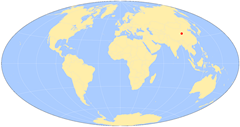
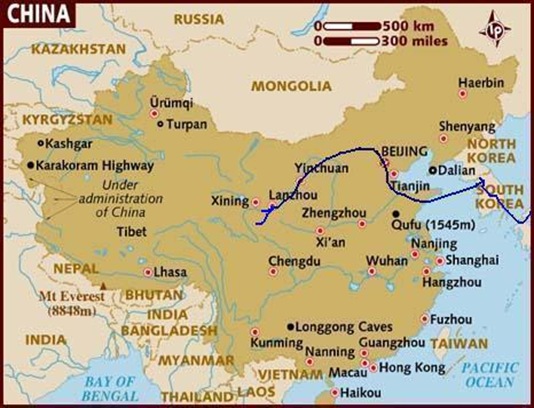
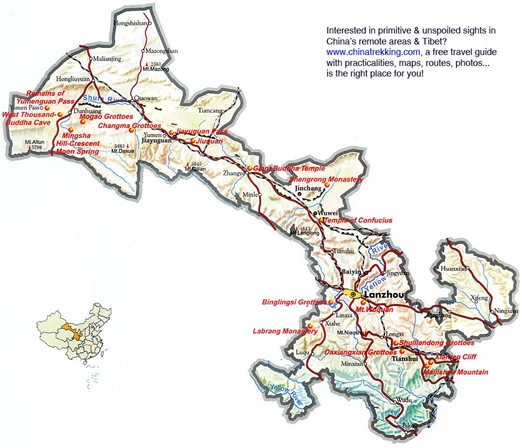
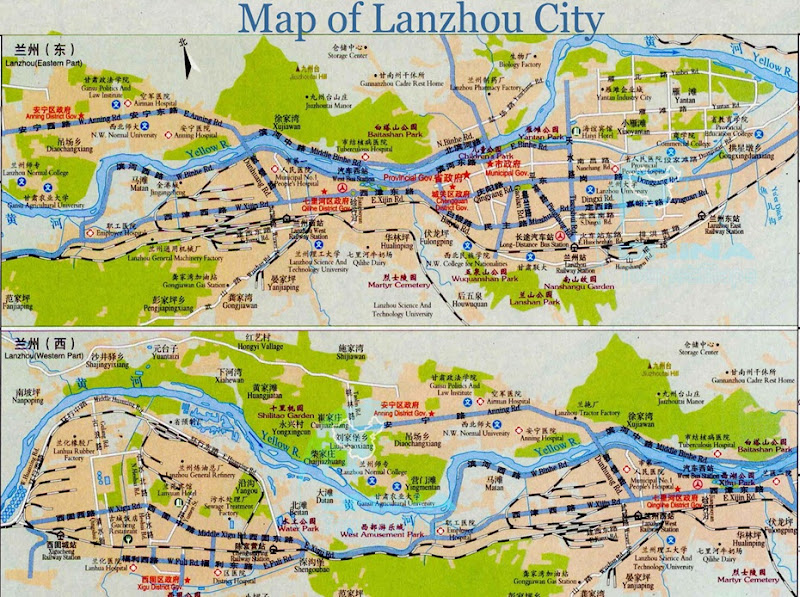
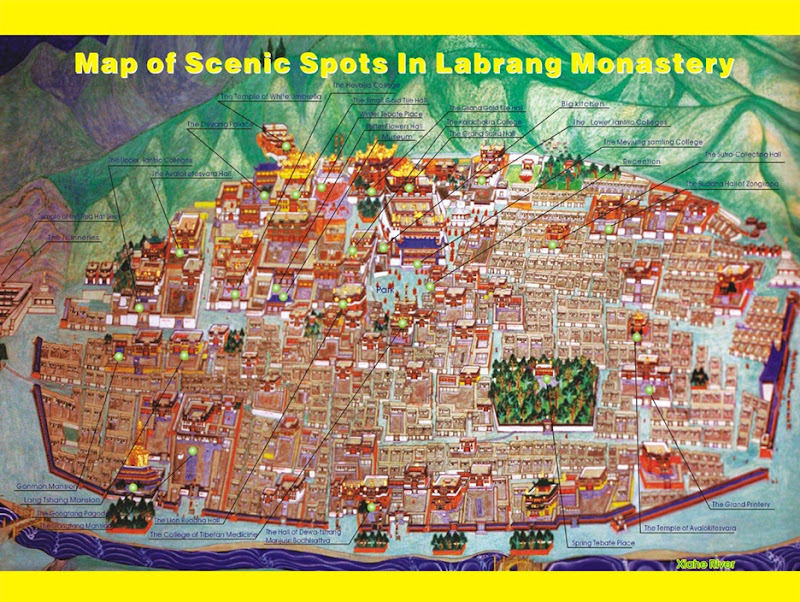


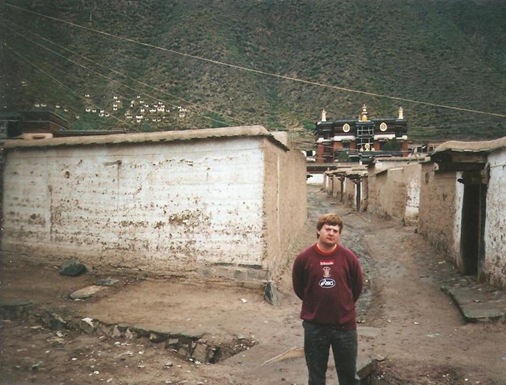
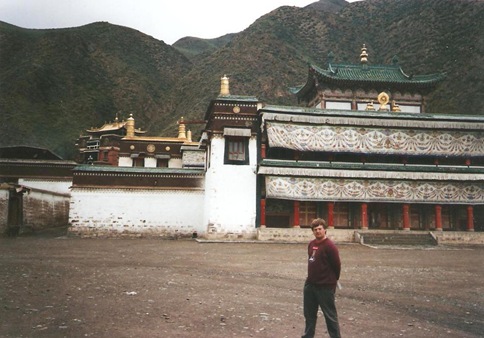
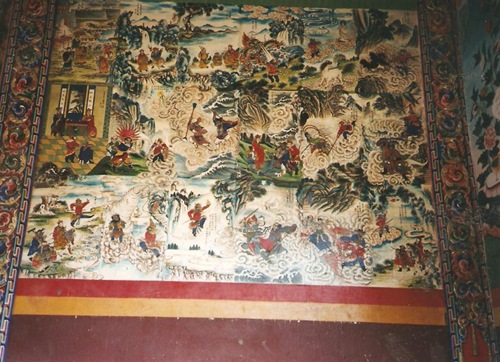
No comments:
Post a Comment